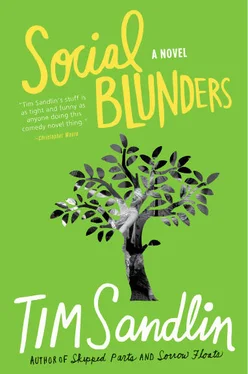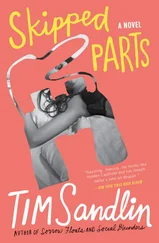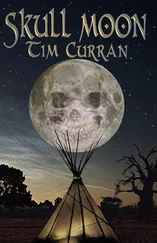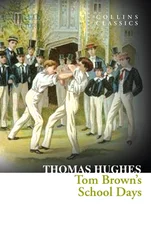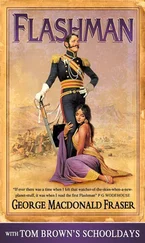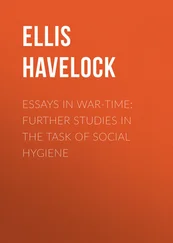Lydia publishes feminist literature, Maurey runs the ranch, I write Young Adult sports fiction, but what keeps all our noses above water is golf carts, an irony not lost on anyone, except possibly Lydia. In some circles I’m known as the golf cart czar. Actually, only one circle, but the people in it pull a lot of weight at country clubs across America. The Callahan family used to be known as carbon paper czars. Caspar Callahan Carbon Paper once stood as a veritable giant in the world of record keeping. But then Caspar died and a couple months later I happened to be in the Wachovia Bank wrangling the red tape it takes to get yourself into a dead relative’s safe deposit box, when the Xerox van delivered a 2400 series copier to the back door.
You’ve never seen such ecstatic secretaries. No more hassles with lining up three sheets of paper. No more smudgy fingers.
I sold out lickety-split. Take that, Minnesota Mining. Absorb another competitor, I’ll just drive down to Atlanta to a baseball game. The San Francisco Giants were playing the Braves—Juan Marichal against Phil Niekro. Willie McCovey led off the eighth by drilling a Niekro screwball through Chief Nokahoma’s tipi—a stand-up triple. Lum Harris chewed and spit and waved in a left-handed reliever.
That’s when the family fortune zipped into the modern era. A big healthy girl in a Braves cap and hot pants rolled through the bullpen in a motorized baseball on wheels, picked up Hoyt Wilhelm, and whisked him, silently, electrically, to the mound. I knew right then, in mid-Cracker Jack bite, that I had to own a motorized baseball.
So, I sank the carbon paper profits into golf carts.
To be honest, which God knows is what I’m striving for here, I didn’t immediately recognize the motorized baseball as a plastic shell mounted on a golf cart. I hated golf then—although not as much as I hate golf now—and I simply didn’t think in terms of market.
Golf isn’t really a sport. It’s fancy pants networking; rich white guys in spiffy outfits, cruising the lawn in one of my carts, comparing financial tidbits and sexual exploitation fantasies. Golf is for doctors and bankers and all those career guys who, being a writer, I consider myself superior to.
We owned one of each Callahan Magic Cart Company model. The garage was so packed that sometimes I had to park my 240Z in the driveway, back when I had a 240Z. Shannon organized cart polo matches over at the junior high football field. Cart polo is an outgrowth of cart croquet. Both games use beach balls, golf carts, and croquet mallets. Cart polo is a lot of fun—you can drink and play simultaneously—and I wish it would catch on with the college kids so I wouldn’t have to feel guilty about making a fortune off a non-sport I find disgusting, boring, and morally offensive.
***
“You didn’t have to come in,” Shirley said. “Everything’s flowing smooth as peaches, so we don’t have any use for you.”
“I thought it was time I stop moping around the house and get back to work.”
“Moping around the house is what you did best before you married the Queen, and practically all you did while she ruled the roost. I fail to fathom what this ‘get back’ to work refers to.”
Shirley is my bookkeeper and one of the three women who each thinks she runs the Callahan empire. I have Gaylene in production and Ambrosia in sales. All three have copped a the-owner-is-harebrained attitude toward me, forgetting I’m the one who created this nifty system of delegated authority. I hired them all years ago at salaries considerably higher than what’s paid men in similar jobs. Back then, Carolina women didn’t even have similar jobs. Shirley, Gaylene, and Ambrosia came from positions where they mostly fetched refreshments, ran personal errands, and covered the boss’s butt when he screwed up—with raises directly contingent on attitude.
Ambrosia, who has the thickest accent in the South, explained to me what attitude means in upper-level management lingo. “A good attitude is when you’ll suck off the boss and a bad attitude is when you won’t. I had a bad attitude.”
My gang was so thrilled to be chosen for real jobs that they worked twice as hard as men would have and netted me a couple million a year, after taxes. If that makes me a harebrain, the world is full of well-to-do rabbits.
“Pretend I’m your employer, Shirley. Give me tidbits of accounts receivable.”
“Accounts receivable is none of your concern.”
“I’ve already begged my daughter to behave even vaguely like a daughter today. Don’t make me degrade myself to you too.”
Shirley gave me one of those looks I imagine ept sergeants give inept generals. She spoke quickly. “Ambrosia got drunk with some CEO from North Dakota last night and sold his country club a hundred ten Shilohs.” Naming our cart models after Civil War battles gives the line a thematic unity.
“How about Gaylene?”
“Gaylene paid the union steward a kickback. We’re covered through the winter. Anything else you need to know to make believe you’re a vital cog in this here well-oiled machine?”
Shirley has a grandson Shannon’s age. Can you believe a woman that old would treat me with such disrespect? “That’ll be enough.”
She turned back to her office, which is larger than mine. “The Coke machine is out of Fresca again. You want to do something worthwhile, call Dixie Distributing and make some threats.”
“Can you get me their number?”
“You’ve got eyes and fingers. Look it up yourself.”
***
I sat at my desk with my hands folded in my lap, waiting for something to happen to change my dull ache of a life. The desk was completely clean except for a Smith-Corona typewriter in the dead center and a small, framed photograph, facedown, in the left-hand upper corner. The facedown face on my laminated desk belonged to Wanda the wife. I’d put her facedown when I discovered I couldn’t write Young Adult sports fiction with her staring at me in disappointment because I wasn’t Saul Bellow.
I’d never promised to be Saul Bellow, never even hinted that I might write something more literary than tales of right and wrong set in the metaphorical world of the baseball diamond. Sports is today’s battleground between good and evil. The goals of sports are honest and understandable—if you play by the rules using your mind and body to the best of your abilities, you win. Athletes with character flaws lose.
Cowboy-and-Indian fiction used to be good versus evil, until public perception of who were the real-life good guys in that one switched. Real life has nothing to do with good versus evil.
I opened my top drawer and pulled out the manuscript I’d been working on for over two years. Bucky on Half Dome . In the first draft of Bucky Climbs the Matterhorn , Bucky had been Becky. Becky wore braces on her teeth and had a will of iron. She could hang off the rock by the fingers of one hand and live on bushes and berries for a week. Becky was the stuff of legends.
The sex change was performed at my editor’s insistence. She said Young Adults would not accept a female lead, except in the genre of horse books. Teenage girls eat up bonding-with-animals stories, but I refuse to write horse books.
She did allow me to give the boy Bucky a female sidekick, as long as things stayed just pals—non-romantic and for God’s sake, nonsexual. So, I created Samantha Lindell. Bucky and Sam’s relationship is modeled on what I have with Maurey Pierce. It’s not in the books, and none of my teen fans know, but the reason the need for physical release doesn’t cause Bucky and Sam tension is the kids got that one out of the way years ago, before puberty.
Читать дальше
